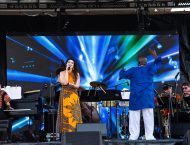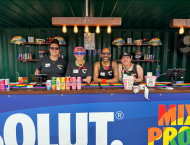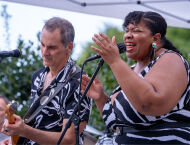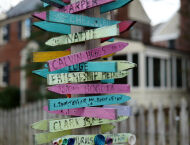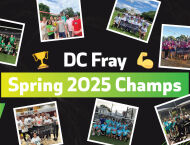Music
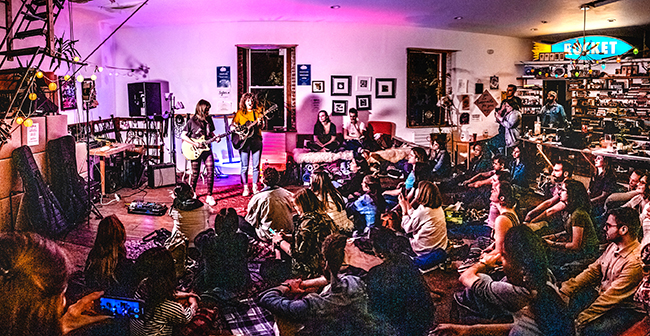 Dwell // Photo: courtesy of Sofar Sounds
Dwell // Photo: courtesy of Sofar Sounds
Sounds of the City: Outside the Music Box
June 29, 2019 @ 12:00am
Whether it’s go-go blasting from a street corner shop or jazz drifting up from a suburban basement, the energy of the creative spaces where music is produced sets the rhythm and determines the pulse that a city can become known for.
DC’s sound has shifted in waves over the decades, largely because the spaces where music is being made are continuously evolving. While the doors of most of the great jazz clubs that once lined U Street have closed and the back rooms and basements of punkdom are harder to come by, in 2019 there are more opportunities to hear live music than there have been in years. But it’s not necessarily the newly opened, traditional-style concert venues that are leaving their mark.
The emergence of brick-and-mortar spaces cared for by artist collectives – more intentional than DIY houses and more accessible than corporate clubs – are the places where the sounds of DC are generated today. And that sound is inextricable from an ethos of community participation in shared experience.
Rhizome DC takes physical shape in an early 20th-century house sitting just on the DC side of Takoma Park. Its founders established what is now a thriving 501(c)(3) after Pyramid Atlantic Art Center moved to Hyattsville and left a hole in the local arts community. The house draws its namesake from French philosopher Gilles Deleuze’s concept: “Unlike trees or their roots, the rhizome connects any point to any other point, and its traits are not necessarily linked to traits of the same nature.” That is, the space is built for multitudes of connections.
“Our main goal is to have lots of different things happening at the same time and nourish each other,” says Michael Smith-Welch, a member of the collective that keeps Rhizome running. “That’s what makes it exciting.”
The whiteboard schedule hanging in the kitchen marks events and shows every day and night of the month. As far as music goes, that means everything from jazz to experimental rock. In its first year, 600 acts came through the doors. Rhizome recently hosted the third annual installation of the Seventh Stanine Festival, a compilation of local musicians and accomplices like funk rockers Beauty Pill and instrumental ensemble Tone.
“A lot of those acts can’t play at the bigger places and it’s what we like: experimental,” Smith-Welch continues.
Rhizome is like a breathing machine – even the bathroom is converted into one big musical instrument. Strum any surface and the room emits an electronic feedback buzz in varying tones. It is also malleable to the needs of its community.
Beyond music, Rhizome offers workshops on fermentation, film and electronics, yoga classes, and an art lab for teens. While no one lives in the house, it does occasionally play host to resident artists, like the group of women who applied for a grant to have space to create while navigating new motherhood. An exhibition currently on display throughout the house is an installation of works from the Justice Arts Coalition, an organization that supports and sponsors incarcerated artists.
Across the city in the Trinidad neighborhood of Northeast DC, a back-alley carriage house is home to Dwell, an “off-grid creative space.” Like Rhizome, Dwell started as an alternative venue for local music when many others were shuttering doors or moving locations. And while it still caters largely to musicians, Dwell too has expanded with the energy of its community.
With no official address and printed maps given to event hosts for distributing to attendees, organizer Hannah Bernhardt says people are already jazzed when they arrive for the first time because they’ve had to interact with the neighborhood in a way they’re not used to just to find the space. Once they do, there is more whimsy in navigating the space itself.
“You get to journey through all of the levels of what happens here,” Bernhardt says. “On the first floor, there is a garage and a boat and evidence of woodworking projects [not to mention a pool table from Black Cat’s renovation days], and you go to the second floor and there’s music happening and the lights are flickering, and then you go up to the roof where there is a garden and a fishpond.”
The fishpond is a cistern of collected water used for the rooftop garden, a gathering spot for people to socialize between musical sets. It was all built out by hand by volunteer members in the community.
Dwell’s programming is managed by Bernhardt and Holly Herzfeld, childhood friends who grew up in the area. They strive to create a space that is welcoming for both the musicians who frequent and anyone who happens to find their way into Dwell.
“There’s a sensitivity and an openness that happens that’s really amazing,” Bernhardt says. “I often hear people say, ‘I’ve never seen anything like this, but it feels like home.’”
Her father David Bernhardt, who owns the physical building, adds, “People who return over a number of visits have a deeper, richer understanding of what’s going on.”
Someone who comes for a show with friends might return alone for a yoga class. This past May’s Dyke Fest drew hundreds of first-timers and familiars alike.
“We are trying to guide the way that space interacts with people,” Bernhardt’s father continues, “to value all the individual groups, tribes and circles that is the Venn diagram of our city and then bring them together. And this becomes Dwell. It’s especially important while Washington is changing again, and so dramatically, that we can set the tone for what is the culture [and] the music in the city and the vibe.”
Hole in the Sky (HITS) DC is another artist collective that congregates in an off-the-beaten-path performance and studio space. Unlike Rhizome and Dwell, however, HITS’ mission is a little more geared toward the needs of artists rather than visitors.
Though iterations of HITS have existed for about a decade, the collective’s current form really began to take shape about five years ago when a few artists set up studio space in the lofted building on the edge of Brookland that actually feels like a literal hole – not in the wall, but in the sky.
Annmarie Dinan Hansen is one of the lead organizers at HITS, which she describes as a “very fluid space,” one given to the “wants of those who are invested most in it” – a.k.a., those paying for the lease on the building. For Hansen, who has a punk background, that means a focus on punk music and “facilitating art forms that are underrepresented performance-wise.”
“We’re constantly navigating what it can and should be,” Hansen says.
That navigation hasn’t come without its challenges.
“There was a time when it had a reputation as not a particularly safe space for women,” notes Hansen, a vibe she hopes is changing. “We’ve been having a lot of events.”
HITS hosts a variety of collaborative gatherings, exhibitions for juried art shows, and other collectives and individuals in need of space to make, display and be inspired by art.
Conner Casey, a woodworker, folk musician and current HITS member, says that in addition to performance, the space is crucial for working artists.
“[This] can’t even exist as anything other than DIY,” he says. “It needs to be used as an arts space.”
Despite the enthusiasm of the communities that they build and serve, the “out-of-the-box” and “under-the-radar” nature of spaces like Rhizome, Dwell and HITS does not make them immune to developers’ dreams. Rhizome’s landlords, for example, own the Starbucks down the street and have visions of condos replacing the rickety white house on the hill.
But one thing is certain: DC needs these spaces. In them, music is binding force and a natural backdrop to the multitudes of expression that they foster. The subtle undertone of the sound they release seems to be: our city’s arms are open…come create with us.
Dwell: alley behind the 1200 block of Florida Avenue in NE, DC (between Montello and Trinidad Streets); www.dwelldc.info
Hole in the Sky DC: 2110 5th St. Unit 2, NE, DC; www.holeintheskydc.com
Rhizome DC: 6950 Maple St. NW, DC; www.rhizomedc.org
Support the Scene
A slew of small “official” venues around town also give lots of love to local bands. You can stumble into one of the following spots on pretty much any night of the week and likely catch an up-and-coming musical act.
Comet Ping Pong
Comet has been serving pizza and wicked backhands since 2006. It has also hosted thousands of live shows. Don’t miss local faves Park Snakes on July 15. 5037 Connecticut Ave. NW, DC; www.cometpingpong.com
Dew Drop Inn
Dew Drop is the hippest little train track hideaway in town. They just celebrated their fourth anniversary with a whiskey fountain and free hot dog bar. Don’t miss the triple threat of Lightmare, Dot.s (ATL) and Erotic Thrillers on July 11. 2801 8th St. NE, DC; www.dewdropinndc.com
Marx Café
If you dig jazz, blues, DJs and the Revolution, get your Commie ass to Mt. P’s Marx Cafe. 3203 Mt. Pleasant St. NW, DC; www.marxcafemtp.com
Pie Shop
The folks running Pie Shop are local musicians themselves, so they know what’s up. Plus, you can order sweet and savory pies from Dangerously Delicious downstairs and enjoy the rooftop patio between sets. 1339 H St. NE, DC; www.pieshopdc.com
The Pinch
14th Street feeling a little too posh these days? Head to the Pinch, go down to the basement lounge and revel in a good, old-fashioned punk show. 3548 14th St. NW, DC; www.thepinchdc.com
Slash Run
Named “best neighborhood joint” in 2018, their slogan kind of says it all: beer, burgers, rock ‘n’ roll. 201 Upshur St. NW, DC; www.slashrun.com


